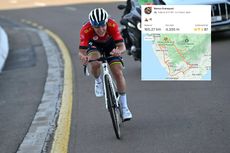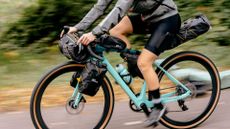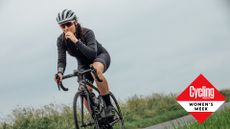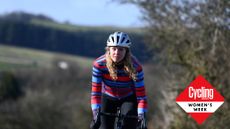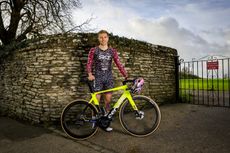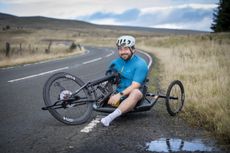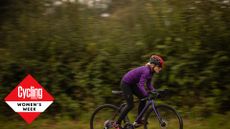Three's peak: How a trio of veteran women TT racers set a blistering new Three Peaks record
Three women, three peaks, one target: to hike up and down each mountain, cycling from one to the next, in record time. CW finds out how they got on
- (opens in new tab)
- (opens in new tab)
- (opens in new tab)
- Sign up to our newsletter Newsletter
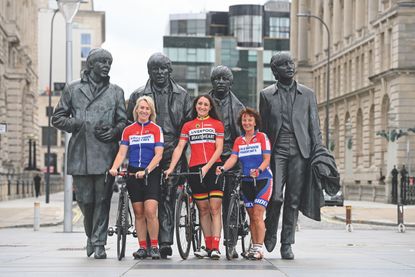

This article was originally published in Cycling Weekly's print edition as part of the long-running MY FITNESS CHALLENGE series.
In June 2021 three British women set a new Guinness World Record for the UK National Three Peaks Challenge by bicycle as a female team. They successively climbed, descended and cycled between the highest mountains in Wales, England and Scotland – Snowdon, Scafell Pike and Ben Nevis – in 67 hours, 30 minutes. Impressive, you might think. But when Liverpool Phoenix CC’s Colin McCallum heard about it, his first thought was something else: I know some women who could beat that.
“Colin read an article about the three women and sent it to me in February,” remembers Janet Fairclough. “It was accompanied by a note that said: Thought this might be up your street, Jan – how about a Phoenix team?” Fairclough is 62 and for the past decade has been recording TT performances the envy of women half her age. After retiring from Tata Steel in 2019, she decided to train like a full-time athlete and, inspired by Ollie Bridgewood’s ‘Project 49’ feature in CW, took on her own ‘Project 59’ – to ride a sub-hour 25- mile TT at the age of 59. She achieved her goal that September, clocking 58.47 on the R25/3H.
Today Fairclough is speaking to me by video call from her home in Bickerstaffe, Lancashire, sitting alongside her Three Peaks team-mates, NHS podiatrist Louise Johnson, 50, and NHS kidney consultant Hannah Fawcett, 41. How did Fairclough find two other women equally as amenable to McCallum’s suggestion? “The first two people I asked were not interested,” she admits. “One of them said, ‘Ask Louise’; the other said, ‘No thanks’.” Fellow Phoenix CC member and long-distance TT fan Johnson jumped at the idea, and suggested Fawcett, a friend and NHS colleague, to complete the trio.
“Hannah is probably the strongest rider among us,” says Fairclough, recalling her delight when Fawcett threw in her lot without hesitation. “I’m the most experienced anyway,” Fawcett demurs, “as I’ve been road racing since childhood and have ridden countless races over the years, including the Rás in 2013.”
From champs to challenge
All three women had previously competed in the 12-hour time trial championships but none had ever taken on a challenge like this one, demanding more than two full days of unrelenting effort. What’s more, Fawcett was the only experienced hiker among them, so the mountain climbs would be quite literally a step into the unknown. “In early April, as a practice run, we decided to climb Snowdon, then cycle home and back,” says Johnson, “but there had been heavy snowfall on the mountain, so instead we cycled from Llanberis to home and back, then climbed Snowdon the following day.”
For Johnson and Fawcett as full-time NHS workers, there was no spare time to significantly increase their training volume. “We had to fit in the long rides around work, which for me included commuting by bike,” says Fawcett, “but I couldn’t do more than about 10 hours of riding a week.” They managed to squeeze in a training hike up Scafell Pike together, arguably the toughest climb they would face.
The Three Peaks rules do not stipulate any particular route between the mountains, so part of the challenge is selecting the best roads. Fairclough got in touch with the existing record holders, who generously shared their route maps. “We based our plan on their route,” says Fawcett, “modifying it wherever we spotted an opportunity to go faster.” The start date for the record attempt was set for Saturday 25 June. This being Britain, the time of year was no guarantee of good weather. “It was 50mph winds and heavy rain!” Johnson grimaces. “We started the climb of Snowdon at 4am, and the weather just kept getting worse.” It got so extreme on the descent that a gust of wind knocked Fairclough off her feet. “I landed hard on the rocks, and I thought it was all over,” she says. “My knee was swollen and I wasn’t sure I’d be able to cycle.”
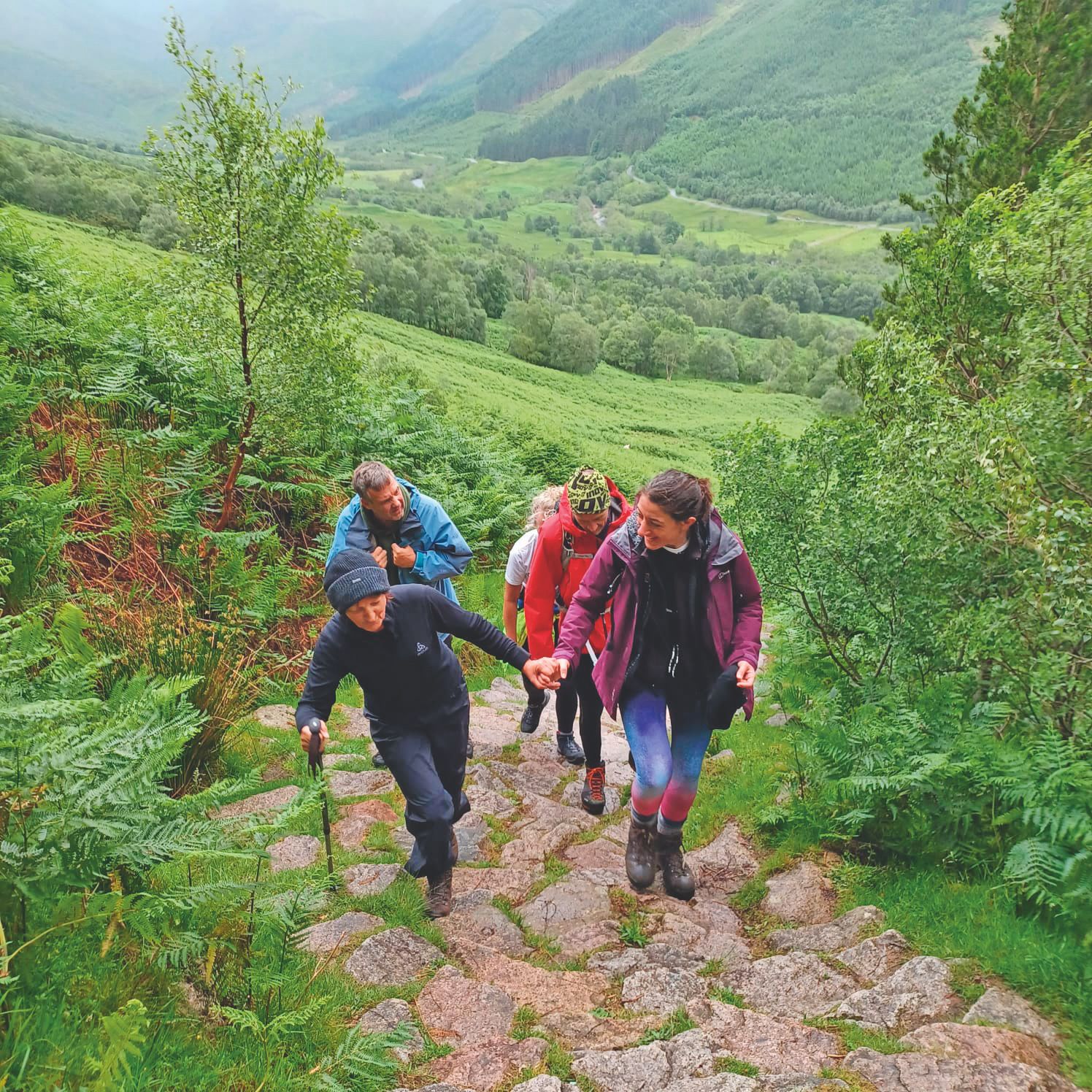
On to Scafell Despite the soreness and everyone being soaked through, they got on their bikes at the foot of Snowdon and set off for Cumbria at just before 8am. The 200-mile ride from Llanberis to the foot of Scafell Pike passed without a hitch: they averaged 17.3mph and arrived on schedule, earning their first proper break. “The plan was to get four hours of sleep,” says Fawcett, “but it wasn’t easy with heavy rain bashing against the hotel windows.” Forty winks later, at 2am they were back in their hiking gear.
At the top of Scafell, the sun was up and they were notionally halfway – one-and-a-half of the three mountains conquered – with time on their side. “Our schedule was based on finishing five hours quicker than the existing record,” says Fairclough, “so we knew we were comfortably ahead.” From the foot of Scafell, it was straight back onto their saddles and into another 200-mile ride, this time up to the Scottish Highlands. Once across the Trossachs, it was time for the second of their two scheduled sleeps. Although as soon as they were deeply asleep, it was time to wake up for the final bike leg, 55 miles to Ben Nevis.
Though back on their bikes, there was now a serious complication: Fairclough had developed severe discomfort in her back. “Jan could no longer straighten up when she got off the bike – she was listing to one side,” says Johnson. “It was very, very painful,” admits Fairclough. It got so bad by the time they arrived at Ben Nevis, the team’s leader could neither stand up straight nor keep her balance on rough ground. Was the record in doubt at this point? “Nothing was going to stop her,” Johnson smiles.
For the entire climb, Fairclough was holding on to the hand of either Johnson or Fawcett just to keep steady on her feet. “Other walkers were looking at me aghast, thinking I was being dragged up by my daughter,” chuckles Fairclough. Despite these difficulties, the trio chivvied each other up and down Ben Nevis – total elevation of 1,147m – in just under six hours.
Shortly after 6pm on Monday they reached the foot of Ben Nevis and stopped the clock: 62 hours and five minutes, beating the previous record by a whopping five hours 24 minutes. “We took nothing for granted until we got there,” says Fairclough, “as anything could have happened on that last descent.” Clubmates were following the live feed from the team’s trackers, and their phones began pinging with congratulatory texts. I put it to them that their ride is likely to inspire others. “I think so,” Johnson grins, “especially at our age.”
There is a lively camaraderie between the three team-mates, they spark off each other throughout our conversation, and I sense it won’t be long before they take on another grand adventure together. “Oh yeah!” enthuses Johnson. “I’m just waiting for someone to suggest something,” Fairclough responds. “We can discuss it at the weekend,” laughs Fawcett, “we’re competing against each other in a ‘25’ on Sunday.”
'They'll never know what they've done for us'
Liverpool Braveheart CC member Gary English supported the team throughout each of the hiking sectors. Here, he pays tribute to their achievement and gives personal thanks for their fundraising
I’ve known Hannah for many years, and I know Jan and Louise through the local cycling community. As a fell runner, I was keen to support the team as soon as I heard about the challenge. It was an honour and a privilege, and even more so when they revealed to me that they were raising money for the Cauda Equina Champions Charity. My wife Robyn has the condition [dysfunction of the nerve roots of the cauda equina at the base of the spine] – she used to cycle and run, but spinal operations left her having to learn to walk again. It’s a relatively rare but a life-changing condition. The three girls wanted to help raise awareness – they’ll never ever know what they’ve given us. I supported the team on each of the mountains, making sure they were safe, as well as providing roadside support.
You can sponsor the team at bit.ly/3vqkJm7
This article was originally published in the 18 August 2022 print edition of Cycling Weekly magazine. Subscribe online and get the magazine delivered to your door every week. (opens in new tab)

Thank you for reading 10 articles this month* Join now for unlimited access
Enjoy your first month for just £1 / $1 / €1
*Read 5 free articles per month without a subscription

Join now for unlimited access
Try first month for just £1 / $1 / €1

David Bradford is fitness editor of Cycling Weekly (print edition). He has been writing and editing professionally for more than 15 years, and has published work in national newspapers and magazines including the Independent, the Guardian, the Times, the Irish Times, Vice.com and Runner’s World. Alongside his love of cycling, David is a long-distance runner with a marathon PB of two hours 28 minutes. Having been diagnosed with retinitis pigmentosa (RP) in 2006, he also writes about sight loss, equality and social affairs.
-
-
 Remco Evenepoel obliterates Tenerife's Mount Teide Strava KOM
Remco Evenepoel obliterates Tenerife's Mount Teide Strava KOMReigning World Champion currently in altitude training before next week's Volta a Catalunya
By Tom Thewlis • Published
-
 Outdoor clothing brand Jack Wolfskin doubles down on bikepacking apparel and luggage
Outdoor clothing brand Jack Wolfskin doubles down on bikepacking apparel and luggageThe outdoor brand rolls into the adventure cycling market with a more refined collection
By Hannah Bussey • Published
-
 Female-specific nutrition strategies: how to adjust your fuelling at each stage of the menstrual cycle
Female-specific nutrition strategies: how to adjust your fuelling at each stage of the menstrual cycleYour carbohydrate and protein demands vary greatly throughout the month - here’s how to make sure you’re giving your body what it needs
By Andy Turner • Published
-
 Strava data shows women restricted by daylight hours for exercise - but female Gen Z Brits prove more active than men
Strava data shows women restricted by daylight hours for exercise - but female Gen Z Brits prove more active than menGlobal data reveals women 8% less likely to exercise outside post-sunset
By Anna Marie Abram • Published
-
 Seven ways ‘traditional’ cycle training approaches don't work for women - and what you can do instead
Seven ways ‘traditional’ cycle training approaches don't work for women - and what you can do insteadFemale physiology demands a different approach to training, nutrition, weight management and recovery – Dr Stacy Sims explains
By Deena Blacking • Published
-
 It's 'Women's Week' on Cycling Weekly: your guide to the training, tech and inspirational tales of (and by!) cycling's key women
It's 'Women's Week' on Cycling Weekly: your guide to the training, tech and inspirational tales of (and by!) cycling's key womenWe've got detailed articles on training with the menstrual cycle, a look back at the woman who entered the 1924 edition of the Giro d'Italia, and a dive into 'women-specific geometery' and its relevancy today - plus much, much more!
By Anna Marie Abram • Published
-
 'It's still bike racing!': The former superbike star making the switch to cycling
'It's still bike racing!': The former superbike star making the switch to cyclingEx superbike racer Bradley Jones tells CW how cycling helped him recover from a huge crash and why non-motorised bike sport is now his main focus
By Giles Belbin • Published
-
 'I was standing at the bar and my leg snapped in two': From shock diagnosis to Paralympic ambition
'I was standing at the bar and my leg snapped in two': From shock diagnosis to Paralympic ambitionRefusing to let amputation sideline him from sport, Jake Woods is rebuilding his athletic career – only this time it’s his hands turning the pedals
By David Bradford • Published
-
 The force reawakens: Milan Vader's incredible comeback from near-fatal crash that broke his back in 11 places
The force reawakens: Milan Vader's incredible comeback from near-fatal crash that broke his back in 11 placesAfter a horrific crash over a guard rail at Itzulia Basque Country in April, the Jumbo-Visma rider was left fighting for his life. Here, he tells CW about his incredible comeback
By Chris Marshall-Bell • Published
-
 Stock bike setups are often stacked against women and smaller adult cyclists - here’s how to achieve a better fit
Stock bike setups are often stacked against women and smaller adult cyclists - here’s how to achieve a better fitFrom frame size to stance width, crank length to brake levers, here's eight common issues faced by smaller adult cyclists – and a bike fitter’s advice on how to overcome them
By Nicole Oh • Last updated
